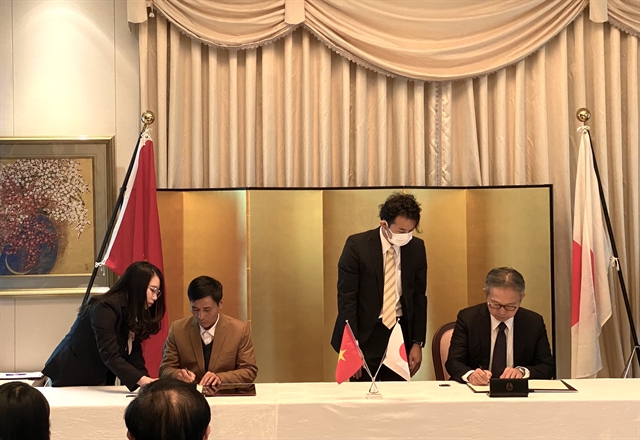 Society
Society


|
| Japanese Ambassador to Việt Nam Takio Yamada and a representative from Bắc Kạn Province signed a project providing clean water systems in the province. — VNS Photo Thu Vân |
HÀ NỘI — The Japanese embassy in Việt Nam on Wednesday signed contracts to provide non-refundable aid worth over US$1.14 million for seven small-scale projects in 2020, which are under a non-refundable programme for Việt Nam at grassroot levels.
The seven projects are in different fields such as: bomb and mine detection and clearance in Quảng Bình Province; building clean water systems in Bắc Kạn Province, building classrooms in Thanh Hoá and Lai Châu provinces, building inter-village road in Lai Châu Province, supplying Braille printing equipment for three northern provinces, and tuberculosis screening X-ray equipment.
Addressing the event, Japanese Ambassador to Việt Nam Yamada Takio said the small scale projects would address the urgent needs of local residents.
"Although the scale of each project is not large, the programme has implemented about 92,680 projects, with a total amount of US$58 million, bringing many benefits to local people," Ambassador Yamada said.
“The Japanese government wants to further strengthen the bilateral relationship through the efficient use of Japanese technology. I hope the programme will touch the hearts of the people of the two countries,” said the Japanese ambassador.
The bomb detection and clearance project in Quảng Bình Province is the one with the largest cost of the seven projects, with a total aid amount of over $636,000.
"Quảng Bình is one of the most landmine-contaminated provinces in the country due to its proximity to the demilitarised zone during the war," Lê Anh Thu, programme officer of the Mines Advisory Group (MAG), said.
Thanks to Japanese support, MAG aims to carry out 134 mine/UXO training sessions to 2,459 people in high-risk areas. Nearly nine million sq.m of land will be surveyed and more than 2.4 million sq.m of land will be cleared, making the land safe for more than 600 people.
The remaining projects cost between $75,000 and $90,000.
Among the seven projects, the most obvious application of Japanese technology was the one to supply a mobile X-ray machine to a company specialised in screening for tuberculosis for people in need.
Currently, TB is still a big burden for Việt Nam. Each year, the country has about 170,000 people infected with tuberculosis, but up to 65,000 people are not treated by the national TB programme, according to Phạm Quang Dũng, director of IRD Vietnam - which will receive the mobile X-ray scanners.
To reduce deaths, it is important to screen for people at high risk through ambulatory X-ray systems. But the transport of mobile X-ray vehicles is a barrier in remote areas and islands.
“Therefore, this project uses the latest technical solutions from Japan. It's a Fujifilm hand-held X-ray machine, not much bigger than a handheld camera, and Fujifilm's artificial intelligence (AI) film reading technique,” Dũng said.
The goal is to conduct a total of 80 days of mobile X-ray screening, giving check-ups for 300 people a day, including high-risk groups. — VNS




